时间介词
关于时间的介词
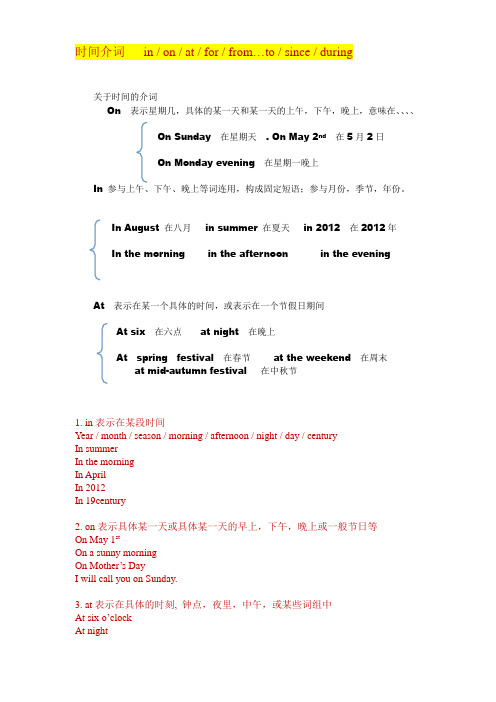
时间介词in / on / at / for / from…to / since / during关于时间的介词On 表示星期几,具体的某一天和某一天的上午,下午,晚上,意味在、、、、On Sunday 在星期天 . On May 2nd在5月2日On Monday evening 在星期一晚上InIn August 在八月in summer 在夏天in 2012 在2012年In the morning in the afternoon in the evening At 表示在某一个具体的时间,或表示在一个节假日期间At six 在六点at night 在晚上At spring festival 在春节at the weekend 在周末at mid-autumn festival 在中秋节1. in表示在某段时间Year / month / season / morning / afternoon / night / day / centuryIn summerIn the morningIn AprilIn 2012In 19century2. on表示具体某一天或具体某一天的早上,下午,晚上或一般节日等On May 1stOn a sunny morningOn Mother’s DayI will call you on Sunday.3. at表示在具体的时刻, 钟点,夜里,中午,或某些词组中At six o’clockAt nightAt the end of …..At lastThe meet will be ended at 10 AM.4. for and inFor + 一段时间,强调某动作或状态持续了多长时间In + 一段时间:表示将来,译为“…..以后”I have been here for a week.She went to Beijing for two days.My father will come back in a week.His uncle is coming to visit him in this summer.5. from…to意思为“从…到…”I often read novel from six o’clock to seven o’clock in the morning.6. since “自从….”I have been teaching English since 2006.It has been raining since last night.7. during 表示在某个特定的时间段之间I will call you during my break time.时间介词in / on / at / for / from…to / since / during 强化练习:( ) 1. Children get gifts ____ Christmas and ____ their birthdays.A. on; onB. at; onC. in; inD. in; on( ) 2.----There is nothing ____tomorrow afternoon, is there?-----No. We can have a game of table tennis.A. onB. inC. outD. up( ) 3. A lot of students in our school were born____March, 1981.A. inB. atC. onD. since( ) 4. He suddenly returned____ a rainy night.A. onB. atC. inD. during( ) 5. My grandfather was born____Oct. 10, 1935.A. onB. inC. atD. of( ) 6. The train is starting___five minutes.A. inB. atC. forD.still( ) 7. Mike does his exercises ____ seven _____ the evening.A. on; toB. at; inC. by; ofD. at; on( ) 8. Children wake up very early____the morning of Christmas Day.A. inB. onC. forD. at( ) 9 ____ a cold winter morning, I met her in the stfeet.A. InB. OnC. AtD. For( ) 10 It happened to be very cold____ the morning of our sports meeting.A. atB. onC. withD. of( ) 11. Why did you get up so early ___ this morning.A. onB. /C. atD. in( ) 12. He went to Shanghai___ September 3rd, 1991 and came back___ a cold morning last ye ar.A. in; onB. on; inC. on; onD. in; in( ) 13. Lucy was born____ the night of May 12, 1984. . ...A. onB. inC. atD. to( ) 14. Mrs. Brown came to China ____ 1996.A.onB. ofC. to,D. in( ) 15 ___ the morning of November 20, 1915, the workers came to Chicago to show their mo urning of Joe Hill.A. OnB. InC. OnD. At( ) 16. Ann moved___Hangzhou___September, 1992.A. /; inB. to; inC. to; on D, in; in( ) 17. They started off___an autumn afternoon.A. duringB. atC. inD. on( ) 18. He often goes ____ school ____ six thirty ____ the morning.A. for; to; inB. to; at; inC. to; for; at D, for; at; to( ) 19. He arrived ___ Shanghai ___ 9: 30 ___ March 5.A. at; in; atB. to; on; atC. in; on; atD. in; at; on( ) 20.The English teacher told me to get there____ half past ten.A: in B. at C. on D. of。
时间介词用法
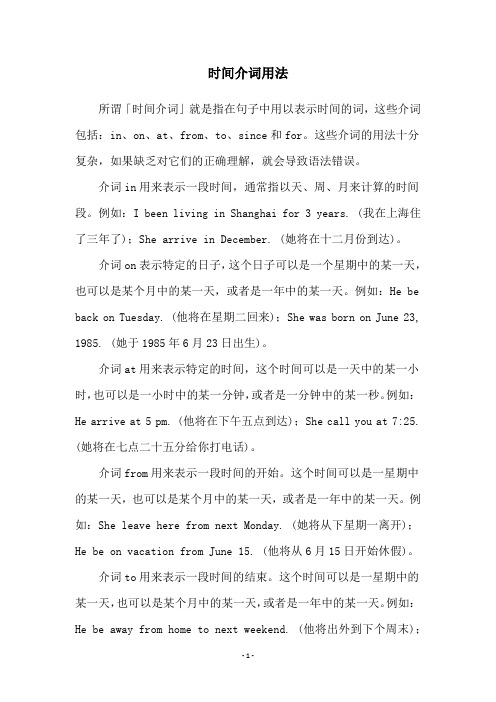
时间介词用法所谓「时间介词」就是指在句子中用以表示时间的词,这些介词包括:in、on、at、from、to、since和for。
这些介词的用法十分复杂,如果缺乏对它们的正确理解,就会导致语法错误。
介词in用来表示一段时间,通常指以天、周、月来计算的时间段。
例如:I been living in Shanghai for 3 years. (我在上海住了三年了);She arrive in December. (她将在十二月份到达)。
介词on表示特定的日子,这个日子可以是一个星期中的某一天,也可以是某个月中的某一天,或者是一年中的某一天。
例如:He be back on Tuesday. (他将在星期二回来);She was born on June 23, 1985. (她于1985年6月23日出生)。
介词at用来表示特定的时间,这个时间可以是一天中的某一小时,也可以是一小时中的某一分钟,或者是一分钟中的某一秒。
例如:He arrive at 5 pm. (他将在下午五点到达);She call you at 7:25. (她将在七点二十五分给你打电话)。
介词from用来表示一段时间的开始。
这个时间可以是一星期中的某一天,也可以是某个月中的某一天,或者是一年中的某一天。
例如:She leave here from next Monday. (她将从下星期一离开);He be on vacation from June 15. (他将从6月15日开始休假)。
介词to用来表示一段时间的结束。
这个时间可以是一星期中的某一天,也可以是某个月中的某一天,或者是一年中的某一天。
例如:He be away from home to next weekend. (他将出外到下个周末);I be in Beijing to Jan. 15. (我将在北京待到1月15日)。
介词since用来表示从某一特定时刻起一直到现在的时间段。
常用表示时间的介词
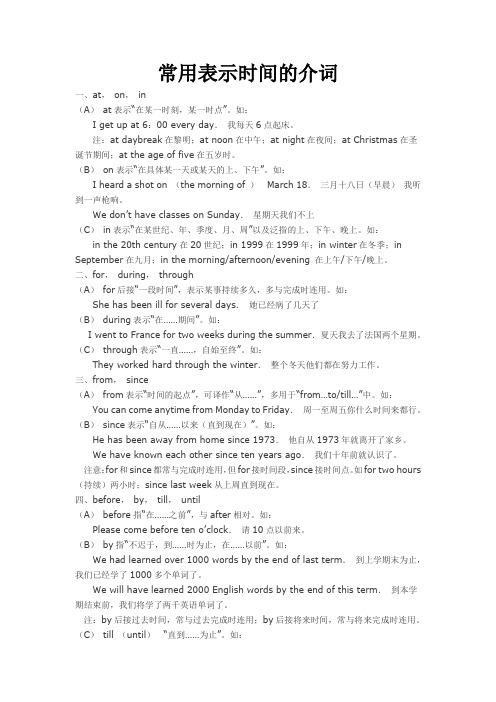
常用表示时间的介词一、at,on,in(A)at表示“在某一时刻,某一时点”。
如:I get up at 6:00 every day.我每天6点起床。
注:at daybreak在黎明;at noon在中午;at night在夜间;at Christmas在圣诞节期间;at the age of five在五岁时。
(B)on表示“在具体某一天或某天的上、下午”。
如:I heard a shot on (the morning of )March 18.三月十八日(早晨)我听到一声枪响。
We don’t have classes on Sunday.星期天我们不上(C)in表示“在某世纪、年、季度、月、周”以及泛指的上、下午、晚上。
如:in the 20th century在20世纪;in 1999在1999年;in winter在冬季;in September在九月;in the morning/afternoon/evening 在上午/下午/晚上。
二、for,during,through(A)for后接“一段时间”,表示某事持续多久,多与完成时连用。
如:She has been ill for several days.她已经病了几天了(B)during表示“在……期间”。
如:I went to France for two weeks during the summer.夏天我去了法国两个星期。
(C)through表示“一直……,自始至终”。
如:They worked hard through the winter.整个冬天他们都在努力工作。
三、from,since(A)from表示“时间的起点”,可译作“从……”,多用于“from…to/till…”中。
如:You can come anytime from Monday to Friday.周一至周五你什么时间来都行。
(B)since表示“自从……以来(直到现在)”。
时间前的介词用法
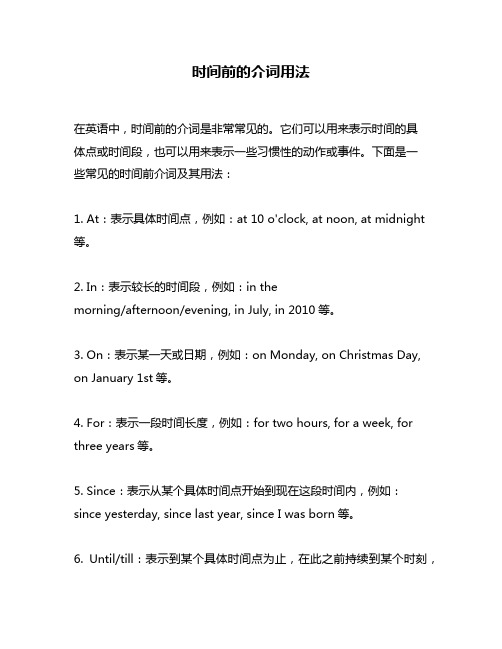
时间前的介词用法
在英语中,时间前的介词是非常常见的。
它们可以用来表示时间的具
体点或时间段,也可以用来表示一些习惯性的动作或事件。
下面是一
些常见的时间前介词及其用法:
1. At:表示具体时间点,例如:at 10 o'clock, at noon, at midnight 等。
2. In:表示较长的时间段,例如:in the
morning/afternoon/evening, in July, in 2010等。
3. On:表示某一天或日期,例如:on Monday, on Christmas Day, on January 1st等。
4. For:表示一段时间长度,例如:for two hours, for a week, for three years等。
5. Since:表示从某个具体时间点开始到现在这段时间内,例如:since yesterday, since last year, since I was born等。
6. Until/till:表示到某个具体时间点为止,在此之前持续到某个时刻,
例如:until/till tomorrow, until/till the end of the month等。
7. By:表示最晚完成某事情的限制时间,例如:by 5 o'clock, by the end of the week等。
8. From/to: 表示一个区间范围内的起始和终止点,例如: from Monday to Friday.
需要注意的是,在使用这些介词时需要注意与其他单词搭配使用时可能产生的语法错误。
同时,在口语交流中也要注意发音和语调以避免产生歧义。
表示时间的介词称为时间介词

表示时间的介词称为时间介词。
表示时间的介词有:at, on, in, before, after等。
一、at, on和in①at 表示:(在(某时刻、时间、阶段),在……岁时)My cousin joined the army at fifteen.我表哥十五岁参的军。
②on 表示:在(某日),在周末,在……节日He was born on the 15th of August in 1769. 他出生于1769年8月15日。
③in 表示:在……事后,在……期间,在……年/月She went to America in 2000.她2000年去了美国。
at, on 和in 作时间介词的比较:①at 表示具体时间点。
②on 后可以跟表日期、星期、节日的词,还可以指具体某一天的早、中、晚。
③in 泛指一天的早、中、晚,还可以表示一段时间,如:周、年、月、季节等。
二、before和after①before 表示:在……之前before eight o’ clock 八点之前Spring comes before summer.夏天之前是春天。
②after 表示:表示……之后after lunch 午饭之后Come to my office after school.放学后请来我办公室。
表示做某事的方法、手段的介词有by,with, in, at, on。
一、byby表示:用,以,靠,通过……方式。
by表示手段时后接动作或制作方式。
“by+ 交通工具”表示交通方式。
by bike 骑车by bus 坐公车bytaxi 搭出租by train 坐火车by ship 乘船byair 坐飞机Linda usually goes to work by subway.琳达通常做地铁上班。
She makes a living by teaching.她考教书谋生。
二、withwith 表示:用,以。
with表示手段时,后接工具、材料或具体内容。
表时间的介词
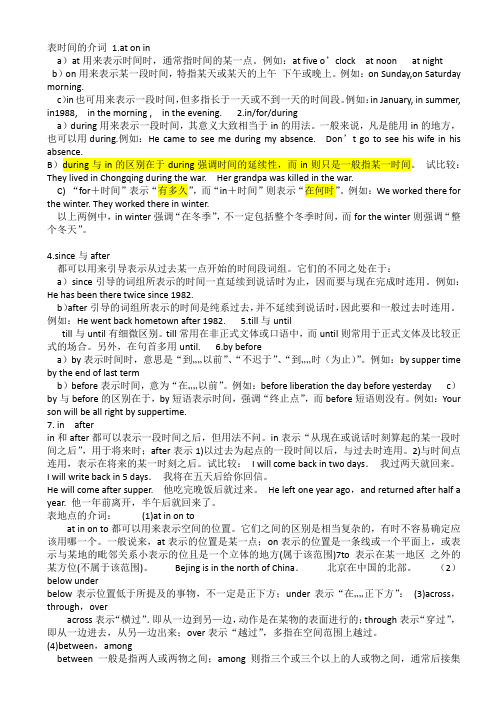
表时间的介词1.at on ina)at用来表示时间时,通常指时间的某一点。
例如:at five o’clock at noon at nightb)on用来表示某一段时间,特指某天或某天的上午下午或晚上。
例如:on Sunday,on Saturday morning.c)in也可用来表示一段时间,但多指长于一天或不到一天的时间段。
例如:in January, in summer, in1988, in the morning , in the evening. 2.in/for/duringa)during用来表示一段时间,其意义大致相当于in的用法。
一般来说,凡是能用in的地方,也可以用during.例如:He came to see me during my absence. Don’t go to see his wife in his absence.B)during与in的区别在于during强调时间的延续性,而in则只是一般指某一时间。
试比较:They lived in Chongqing during the war. Her grandpa was killed in the war.C) “for+时间”表示“有多久”,而“in+时间”则表示“在何时”。
例如:We worked there for the winter. They worked there in winter.以上两例中,in winter强调“在冬季”,不一定包括整个冬季时间,而for the winter则强调“整个冬天”。
4.since与after都可以用来引导表示从过去某一点开始的时间段词组。
它们的不同之处在于:a)since引导的词组所表示的时间一直延续到说话时为止,因而要与现在完成时连用。
例如:He has been there twice since 1982.b)after引导的词组所表示的时间是纯系过去,并不延续到说话时,因此要和一般过去时连用。
时间介词 详解

时间介词详解【原创实用版】目录1.引言2.时间介词的定义与分类3.常用时间介词的用法和例句4.时间介词在句子中的位置5.时间介词与其他词类的搭配6.结论正文【引言】在汉语中,时间介词是用来表示时间的词汇,它们可以帮助我们更加精确地表达事件发生的具体时间。
时间介词在日常生活和书面语中都非常常见,掌握它们对于正确理解和使用汉语具有重要意义。
本文将对时间介词进行详解,以帮助大家更好地掌握和运用这些词汇。
【时间介词的定义与分类】时间介词是用来表示时间的词汇,主要用来修饰动词、形容词、副词等,表示事件发生的具体时间。
根据功能和用法的不同,时间介词可分为以下几类:1.表示时间段的介词:如“在”、“于”、“从”、“自”等。
2.表示时间点的介词:如“在”、“于”、“从”等。
3.表示时间的延续和间断的介词:如“地”、“得”等。
4.表示时间关系的介词:如“跟”、“和”等。
【常用时间介词的用法和例句】以下是一些常用的时间介词及其用法和例句:1.表示时间段的介词:(1)在:表示在某段时间内,后面跟时间段的名词或代词。
例句:他在去年学习了汉语。
(2)于:表示在某个具体的时间点,后面跟时间名词或代词。
例句:他于去年学习了汉语。
2.表示时间点的介词:(1)在:表示在某个具体的时间点,后面跟时间名词或代词。
例句:他在昨天学习了汉语。
(2)于:表示在某个具体的时间点,后面跟时间名词或代词。
例句:他于昨天学习了汉语。
3.表示时间的延续和间断的介词:(1)地:表示动作的持续进行。
例句:他认真地学习了汉语。
(2)得:表示动作的间断进行。
例句:他学习汉语得非常好。
4.表示时间关系的介词:(1)跟:表示两个事件的时间关系。
例句:他跟昨天学习了汉语。
(2)和:表示两个事件的时间关系。
例句:他学习和昨天一样努力。
【时间介词在句子中的位置】时间介词通常放在句子的句首或句中,后面跟名词、代词或动词短语。
在特殊情况下,时间介词也可以放在句末。
【时间介词与其他词类的搭配】时间介词可以与其他词类搭配使用,如“在晚上”、“从昨天起”、“自去年以来”等。
时间介词on in at的用法

时间介词on in at的用法
时间介词是英语中非常常见的一类介词,它们用来表示时间。
其中,on、in和at是最基本的三个时间介词。
它们的用法如下:
1. on
on通常用来表示一个具体的日期,例如:on Monday(星期一)、on August 10th(8月10日)等等。
2. in
in通常用来表示一个时间段或某个月份/季节/年份,例如:in the morning(早上)、in July(7月)、in winter(冬天)、in 2021(2021年)等等。
3. at
at通常用来表示一个具体的时间点,例如:at 3 o'clock(3点钟)、at noon(中午)、at night(晚上)、at Christmas(圣诞节)等等。
需要注意的是,这些时间介词有时需要根据具体语境进行变化。
例如,如果我们要表示“每周三”,应该使用on,即on Wednesdays;而如果我们要表示“在2022年的春天”,则应该使用in,即in the spring of 2022。
总之,掌握这些时间介词的用法,能够帮助我们更准确地表达时间和时间段。
- 1 -。
- 1、下载文档前请自行甄别文档内容的完整性,平台不提供额外的编辑、内容补充、找答案等附加服务。
- 2、"仅部分预览"的文档,不可在线预览部分如存在完整性等问题,可反馈申请退款(可完整预览的文档不适用该条件!)。
- 3、如文档侵犯您的权益,请联系客服反馈,我们会尽快为您处理(人工客服工作时间:9:00-18:30)。
时间介词
介词是一种用来表示词与词, 词与句之间的关系的词。
在句中不能单独作句字成分。
介词后面一般有名词代词或相当于名词的其他词类,短语或从句作它的宾语。
介词和它的宾语构成介词词组,在句中作状语,表语,补语或介词宾语。
表示时间的常用介词有 at, in, on, after, before, until, during, by, since, from, for.
用法说明
at 表示某一时刻或较短暂的时间,或泛指圣诞节,复活节等。
at seven 在七点钟at a quarter to one 也可用于固定搭配中at noon at night
in in表示较长时间如世纪、朝代、时代、年、季节、月及一般(非特指)的早、中、晚等。
in the twenty-first century在21世纪 in autumn在秋天in the morning在早上可用于表示“从现在起,多长时间以后或多久之后”的短语
They will finish the work in an hour 一小时后他们完成这项工作
on主要用在星期几,具体某一天或某一天的早,中,晚或节日前
on the Mid-autumn Day在中秋节
on a warm spring afternoon在一个温暖的春天的下午
on June 1st在六月一号
after 表示以过去为起点的某一段时间之后,用于过去时
They finished the work after two years 他们两年后完成了这项工作与时间点连用,表示将来某个时间之后
I will ring you after two o’clock
before 在……之前Please bring your homework before ten o’clock
until ①用于否定句中,意为“直到……才”,在其前的谓语动词多用瞬间动词;
②用在肯定句中意为“直到……为止”,其前的谓语动词需用延续性动词
I didn’t go to bed until 10 o’clock 我直到十点才睡觉
I waited for my mother until 10 o’clock 我一直等妈妈到十点钟
during “during + 时间段”与延续性动词连用表示某期间的动作
He lives with us during these years 这些年他和我们一起住
by“by + 时间点”表示“到…..以前为止”,如果by后加“将来的时间点”,应用一般将来时;如果by后跟过去的时间点,应用过去完成时
by now=so far=up to now表示”到目前为止”
We will learn 1000 English words by the end of this term.
since 指从某时一直延续到现在,后接时间点,句子或主语用完成时
He has studied English since 2000 自从2000年他就学英语了
From 指从某时开始。
He never spoke to her again from that day on. 从那天以后他再没有同她说过话。
for 指动作贯穿整个过程,后接时间段
I have studied English for six years。
